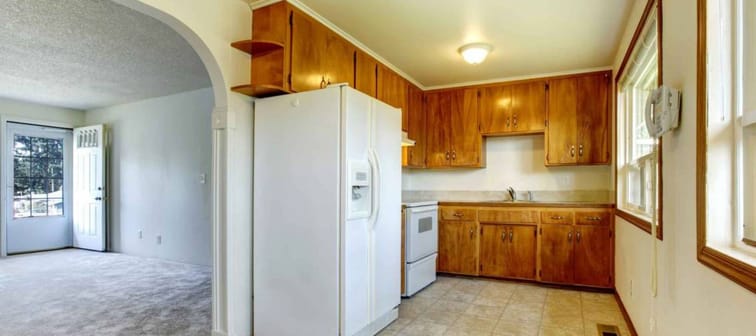What is a starter home?
A starter home, or entry-level house, is a dwelling with an affordable price that you may not plan to live in long-term.
Generally, it may be smaller, older or in need of renovations or repairs. It may also be in a less desirable neighborhood.
Think about the kind of house that home-renovation shows feature as the “before.”
But whatever its condition, a starter home is one that you can afford as a first-time buyer.
Stop overpaying for home insurance
Home insurance is an essential expense – one that can often be pricey. You can lower your monthly recurring expenses by finding a more economical alternative for home insurance.
Officialhomeinsurance can help you do just that. Their online marketplace of vetted home insurance providers allows you to quickly shop around for rates from the country’s top insurance companies, and ensure you’re paying the lowest price possible for your home insurance.
Explore better ratesHow to find a starter home
Starter homes are great options for young professionals or families looking to enter the real estate market. But finding these homes has become a bit harder in recent years.
The popularity of house-flipping TV shows has inspired investors to buy and renovate these abodes to resell at a profit.
First-time buyers trying to save money might find it hard to compete with these investors, who have deep pockets.
House hunters usually know which features they prefer. But the more flexible you are, the more listings and opportunities you might find. Expand your neighborhood options, opt for fewer bedrooms or settle for less modern features.
You can also find more opportunities by considering different types of homes. If a single-family home is out of your budget, a condo or townhouse might fit your needs.
Real estate agents can be good resources. Sometimes they can steer you toward homes that have just been listed. Or they might know of a property that is just about to be listed.
More: How to buy a house without a real estate agent
What’s the alternative?
If it’s too hard to find a starter home in your desired locale, or maybe you’re not keen to live in a home that needs work, you can opt to continue renting for a while longer.
The term “starter home” implies that there’s a next step. For some, that would be the “forever home,” or one that meets the needs of their family indefinitely.
Some hopeful buyers prefer to save money and wait to purchase a home until they can afford what they really want.
More: How much home can you afford?
Need cash? Tap into your home equity
As home prices have increased, the average homeowner is sitting on a record amount of home equity. Savvy homeowners are tapping into their equity to consolidate debt, pay for home improvements, or tackle unexpected expenses. Rocket Mortgage, the nation's largest mortgage lender, offers competitive rates and expert guidance.
Get StartedShould you skip a starter home and wait?
If you have good credit, enough cash saved for a down payment and a manageable amount of debt, you’re theoretically ready to buy a house.
But when you’re priced out of the kind of homes you really want, you might wonder what to do next. Do you hold off until you can afford something better, or do you jump in feet first with an entry-level home?
Let’s go over the pros and cons of waiting to buy that dream home.
Pros of waiting to buy a home
Buying a starter home is a great way to ease into the real estate market. But these homes often have issues that need to be addressed, whether quirky or potentially dangerous.
You might not have the time, ability or funds to undertake home improvement projects, especially if you plan to move in right away.
And if you need to hire professionals to fix things up, you may find you’re not saving that much money on this entry-level home. Especially to a first-time buyer’s untrained eye, it can be hard to tell whether your starter home might instead be a money pit.
There’s also the competition factor. If investors are looking for these kinds of properties, you may find yourself in a bidding war for a starter home.
Also, if you’re looking to save money, it might be a better idea to shop around for lower interest rates. That way you can get into the home you really want but still save some money on annual interest on your loan.
And, if you decide to wait, you’ll also save the added expenses of moving and closing costs again in just a few years when you’ve outgrown the starter home.
Cons of waiting to buy a home
Renting can be cheaper than a monthly mortgage payment, but you’re also putting money in someone else’s pocket every month. The sooner you buy your own home, the sooner you can start building equity in your own property.
You’ll be able to use that equity to fund home improvements (or whatever expenses crop up) down the line, either through a home equity loan or line of credit.
While you’re saving money for your ideal home, there’s no knowing what might happen in the real estate market. When you finally think you’re ready to buy, you may find the finish line is further away than when you started.
Next steps to buying a home
Whatever you decide, whether you go for a starter home or hold off, the best way to save thousands of dollars over the life of your loan is locking in a great mortgage rate.
To do that, you should shop around for offers from multiple mortgage lenders to get the best possible rate.
You can’t control home prices, but you can still find ways to make home ownership more affordable.
Find the Best Mortgage Rates to Fit Your Budget
Looking for a great mortgage rate? Don’t overpay on your home loan! Get updated mortgage rates, expert insights, and tips to lock in the best deal tailored to your needs. Save on monthly payments and make homeownership more affordable. Start your journey to savings now.








